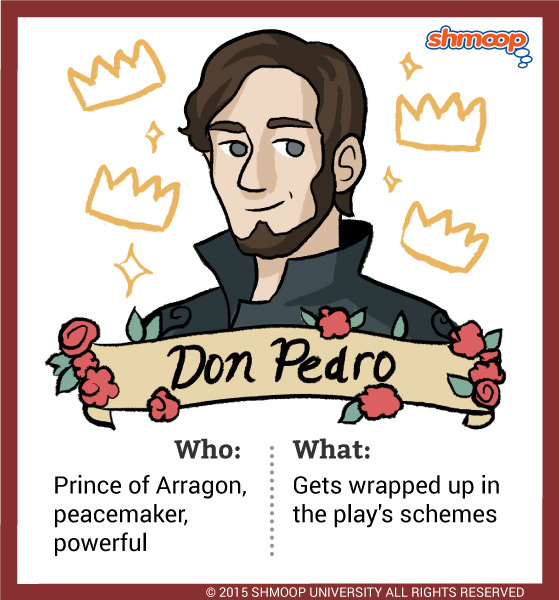Character Analysis

(Click the character infographic to download.)
Prince Charming
This dapper, stand-up guy is the Prince of Arragon, the leader of Benedick and Claudio, a friend of Leonato, the brother of Don John, and lover to... no one.
Don Pedro, sometimes called "Prince," is the most politically and socially powerful character in the play, and is constantly wrapped up in some scheme or another. He’s the enabler that sweet talks Hero secretly on Claudio’s behalf, and the mastermind of the plot to trick Benedick and Beatrice into loving each other. However, Don Pedro also falls into Don John’s scheme when his brother suggests that Don Pedro’s honor and credibility have been compromised through forming dishonorable match between Claudio and Hero.
Don Pedro is something of an elder statesman in the play; Claudio defers to Don Pedro when he wants to get married, and even when Claudio denounces Hero at their wedding, everyone looks to Don Pedro for guidance. Because of his age and maturity, Don Pedro is more venerable and more complex than Claudio. (Not hard, but still.)
Voice Of Reason
He is constantly the voice of reason, and is something of a peacemaker with his clear speech and anti-dramatic tendencies. (Remember, rather than make a big deal out of Claudio thinking he’d stolen Hero, he’s just like, "that’s not what happened," and hands the girl over.) While he’s played upon by Don John’s treachery, he doesn’t lash out passionately about the affair, but simply says that the girl is guilty as charged. He’s loyal to his friends, and leaves the wedding with Claudio and his brother... which would be cool if he hadn’t been mistaken about Hero’s virtue.
Don Pedro has a sense of humor throughout the play, and is quick with a joke, but it’s clear that he’s not as down on marriage as the other guys. He notices Beatrice’s quick wit, and even proposes marriage to her. When she shrugs him off, rather than becoming a sad-eyed puppy, he immediately sets up a scheme to get Beatrice a deserving husband. The maturity he uses to diffuse bad situations is also applied to his own love life; in his personal affairs he seems as level-headed as in political matters.
In the end, Don Pedro is alone, and though it’s a source of fun for Benedick, it’s one of the play’s loose ends that is actually pretty sad. Don Pedro is the closest thing the play has to a tragic character, but he’s not that tragic—because it is definitely a comedy.